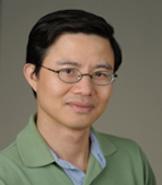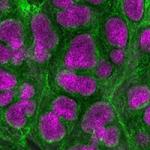
Jinfang Zhu, Ph.D.
Senior Investigator
Molecular and Cellular Immunoregulation Unit
NIAID/DIR
Research Topics
Lymphocytes, CD4 T cells in particular, play a central role in orchestrating adaptive immune responses. After being activated through their T-cell receptor (TCR) in a particular cytokine milieu, naive CD4 T cells differentiate into distinct Th lineages, including Th1, Th2, and Th17 cells, which are indispensable for different types of immunity to various microorganisms. Other CD4 T cells include follicular T cells (Tfh) and regulatory T cells (Treg). Tfh cells are critical for promoting antibody responses, whereas Treg cells, which consist of naturally occurring regulatory T cells (nTregs) and inducible regulatory T cells (iTregs), are involved in maintaining immune tolerance and lymphocyte homeostasis. Inappropriate Th responses to pathogens may lead to chronic infection and/or tissue damage to the host. Similarly, unnecessary activation of Th1, Th17 or Th2 cells by harmless environmental- or self-antigens can cause organ-specific autoimmune diseases or allergic inflammatory diseases.
Recently, a class of innate lymphoid cells (ILCs), whose development requires signaling through the IL-2 receptor (IL-2R) common γ chain and IL-7Rα , has been discovered. Distinct subsets of ILCs are capable of producing similar sets of characteristic effector cytokines as produced by Th cells. Therefore, they are classified into type 1 innate lymphoid cells (ILC1s) that produce IFNγ , type 2 innate lymphoid cells (ILC2s) that produce IL-13 and type 3 innate lymphoid cells (ILC3s) including lymphoid tissue inducers (LTis), ILC17s and ILC22s, that produce IL-17 and IL-22, respectively. ILCs are not only important for lymphoid organ development and immune responses to pathogens, but are also involved in the development of autoimmune and allergic diseases.
Differentiation of Th cells is tightly regulated by the networks of specific transcription factors. At present, the master regulators of Th lineages that have been identified include T-bet/Stat4 (Th1), GATA-3/Stat5 (Th2), RORγt/Stat3 (Th17), Foxp3/Stat5 (Treg) and Bcl-6/Stat3 (Tfh), respectively. However, emerging data suggest that there are many more critical transcription factors in the regulatory network that are critical for T-cell fate determination and function. In addition, the expression of these factors may not be mutually exclusive, in some cases resulting in massive heterogeneity of CD4 T cells. Interestingly, the ILCs also express many key transcription factors that are found in Th cells, suggesting that a given transcription factor may regulate one particular type of immune response in different immune cells.
A complete understanding of how transcription factor complexes are regulated and how they precisely control heterogeneity, plasticity, and stability of Th cells and ILCs has great implication in designing strategies to treat a broad range of immune-related diseases, including chronic bacterial and viral infections such as HIV, autoimmune diseases, allergic diseases, and cancers.
At the Molecular and Cellular Immunoregulation Section (MCIS), the functions of known key transcription factors, including GATA3 and T-bet, and novel, potentially critical transcription factors during Th and ILC differentiation/development are being investigated with various genetically modified mice including conditional knockout strains. To identify and study Th and ILC subsets at a finer level, multi-color “reporter” mice reflecting the expression of key transcription factors, such as T-bet, GATA3, RORγ t and Foxp3, are being prepared through cross-breeding after generation of single reporter mouse strains using BAC transgenic or knock-in strategies. Fate-mapping experiments to address T-cell plasticity and stability are being performed using reporter mice in which inducible-Cre expression is under the control of cytokine or transcription factor locus. By using these indicator and fate-mapping mice, we will study the development of various lymphocyte subsets at steady state and in autoimmune and infectious settings, and compare the gene expression patterns through RNA-seq in “pure” Th and ILC subsets generated both in vitro and in vivo to identify lineage-specific genes. ChIPseq will be applied to assess genome-wide epigenetic modifications and DNA binding sites for key transcription factors in different cell types. Lineage-specific genes found in mice studies may serve as new biomarkers for identifying human T-cell subsets and/or targets for treating specific human diseases.
Biography
Dr. Zhu received his bachelor’s degree summa cum laude from the department of biology, NanKai University, Tianjin, China, and his Ph.D. in biochemistry and molecular biology from the Shanghai Institute of Biochemistry (now known as Shanghai Institute of Biochemistry and Cell Biology), Chinese Academy of Sciences. He joined the Laboratory of Immunology (LI) first as a visiting fellow and then as a staff scientist studying CD4 T-cell differentiation. He was appointed as an Earl Stadtman investigator in the LI in 2011 and received tenure in 2017.
He is interested in investigating heterogeneity and plasticity of immune cells and their functions during normal and pathological immune responses at cellular and molecular levels. His focus is on induction and functions of transcription factor complexes during development, lineage commitment, and maintenance of immune cells, particularly CD4 T helper (Th) cells and innate lymphoid cells (ILCs).
Special Interest Groups
Immunology Interest Group (IIG), Cytokine Interest Group (CIG)
Selected Publications
- Gurram RK, Wei D, Yu Q, Butcher MJ, Chen X, Cui K, Hu G, Zheng M, Zhu X, Oh J, Sun B, Urban JF Jr, Zhao K, Leonard WJ, Zhu J. Crosstalk between ILC2s and Th2 cells varies among mouse models. Cell Rep. 2023;42(2):112073.
- Fang D, Cui K, Cao Y, Zheng M, Kawabe T, Hu G, Khillan JS, Li D, Zhong C, Jankovic D, Sher A, Zhao K, Zhu J. Differential regulation of transcription factor T-bet induction during NK cell development and T helper-1 cell differentiation. Immunity. 2022;55(4):639-655.e7.
- Yu F, Sharma S, Edwards J, Feigenbaum L, Zhu J. Dynamic expression of transcription factors T-bet and GATA-3 by regulatory T cells maintains immunotolerance. Nat Immunol. 2015;16(2):197-206.
- Yagi R, Zhong C, Northrup DL, Yu F, Bouladoux N, Spencer S, Hu G, Barron L, Sharma S, Nakayama T, Belkaid Y, Zhao K, Zhu J. The transcription factor GATA3 is critical for the development of all IL-7Rα-expressing innate lymphoid cells. Immunity. 2014;40(3):378-88.
- Zhu J, Jankovic D, Oler AJ, Wei G, Sharma S, Hu G, Guo L, Yagi R, Yamane H, Punkosdy G, Feigenbaum L, Zhao K, Paul WE. The transcription factor T-bet is induced by multiple pathways and prevents an endogenous Th2 cell program during Th1 cell responses. Immunity. 2012;37(4):660-73.
Related Scientific Focus Areas


Molecular Biology and Biochemistry
View additional Principal Investigators in Molecular Biology and Biochemistry


Microbiology and Infectious Diseases
View additional Principal Investigators in Microbiology and Infectious Diseases

This page was last updated on Thursday, July 24, 2025